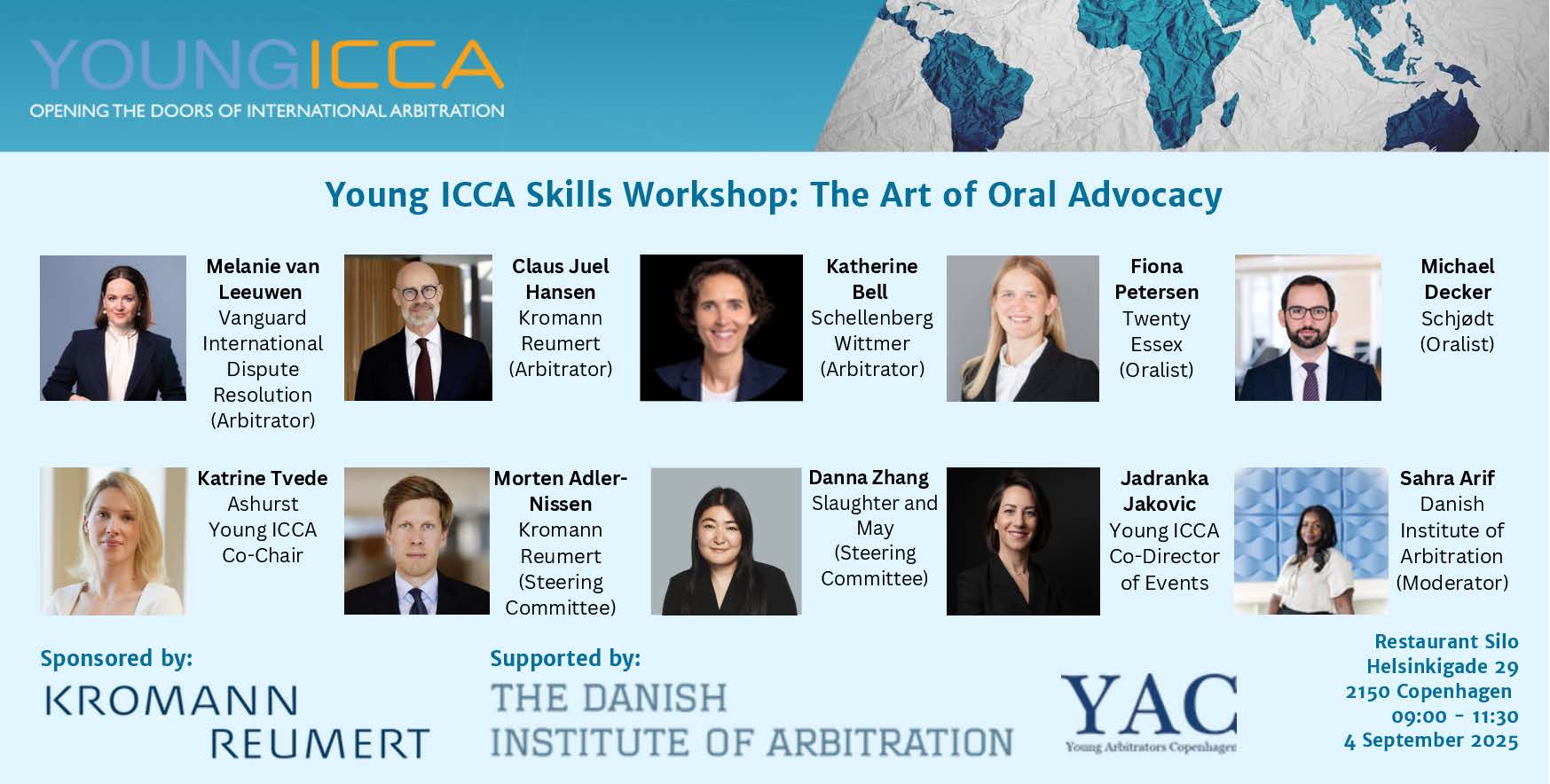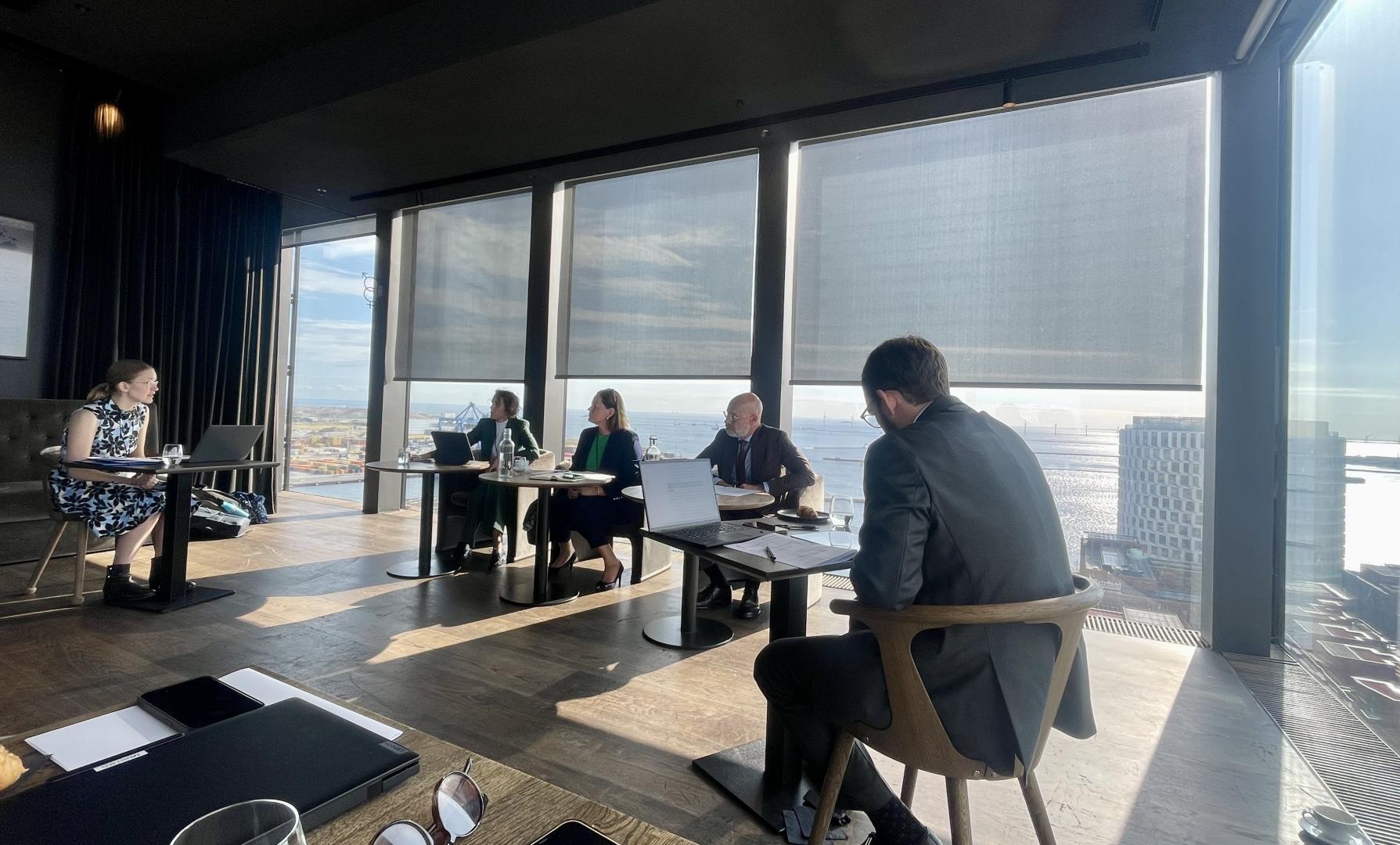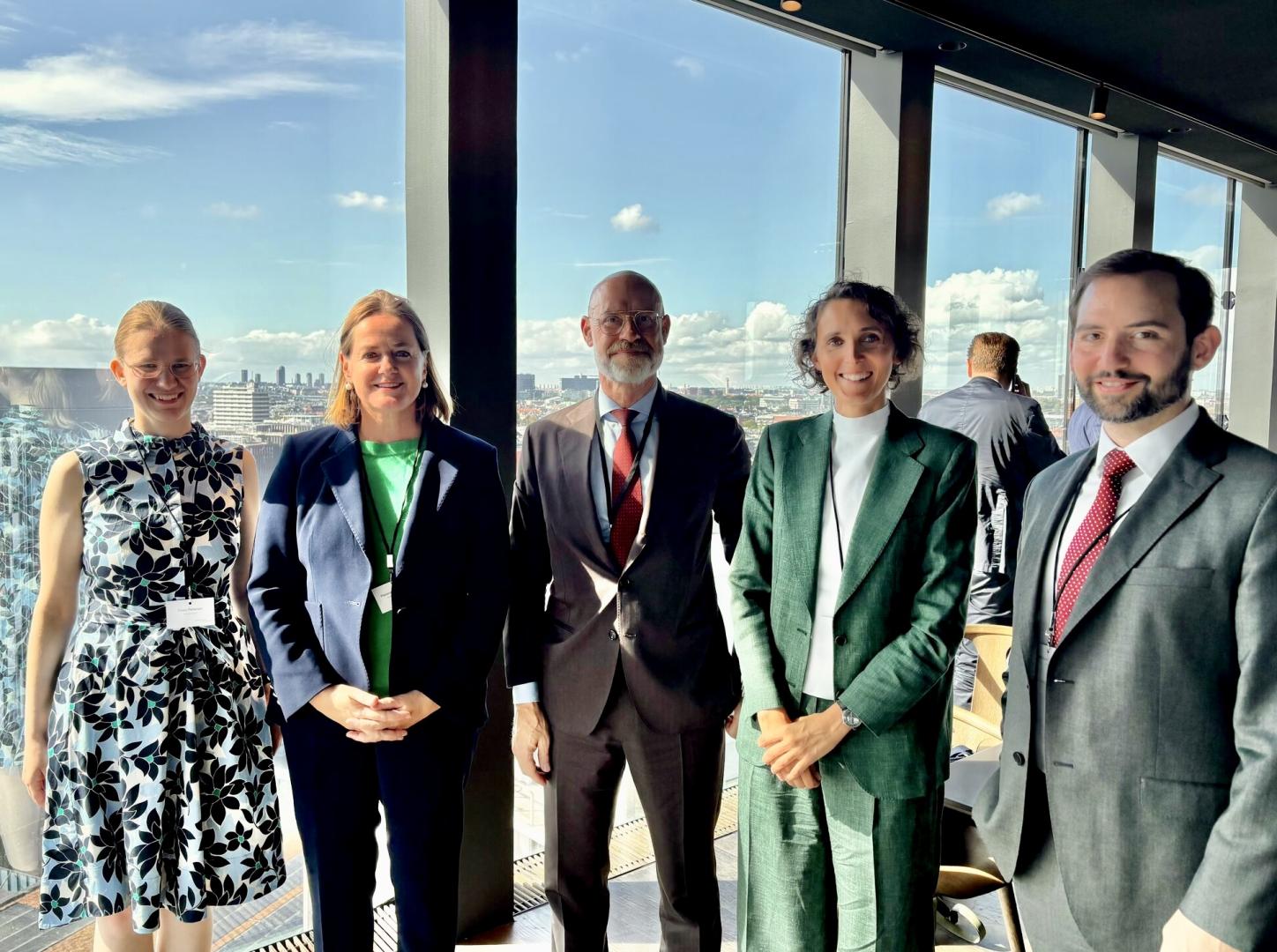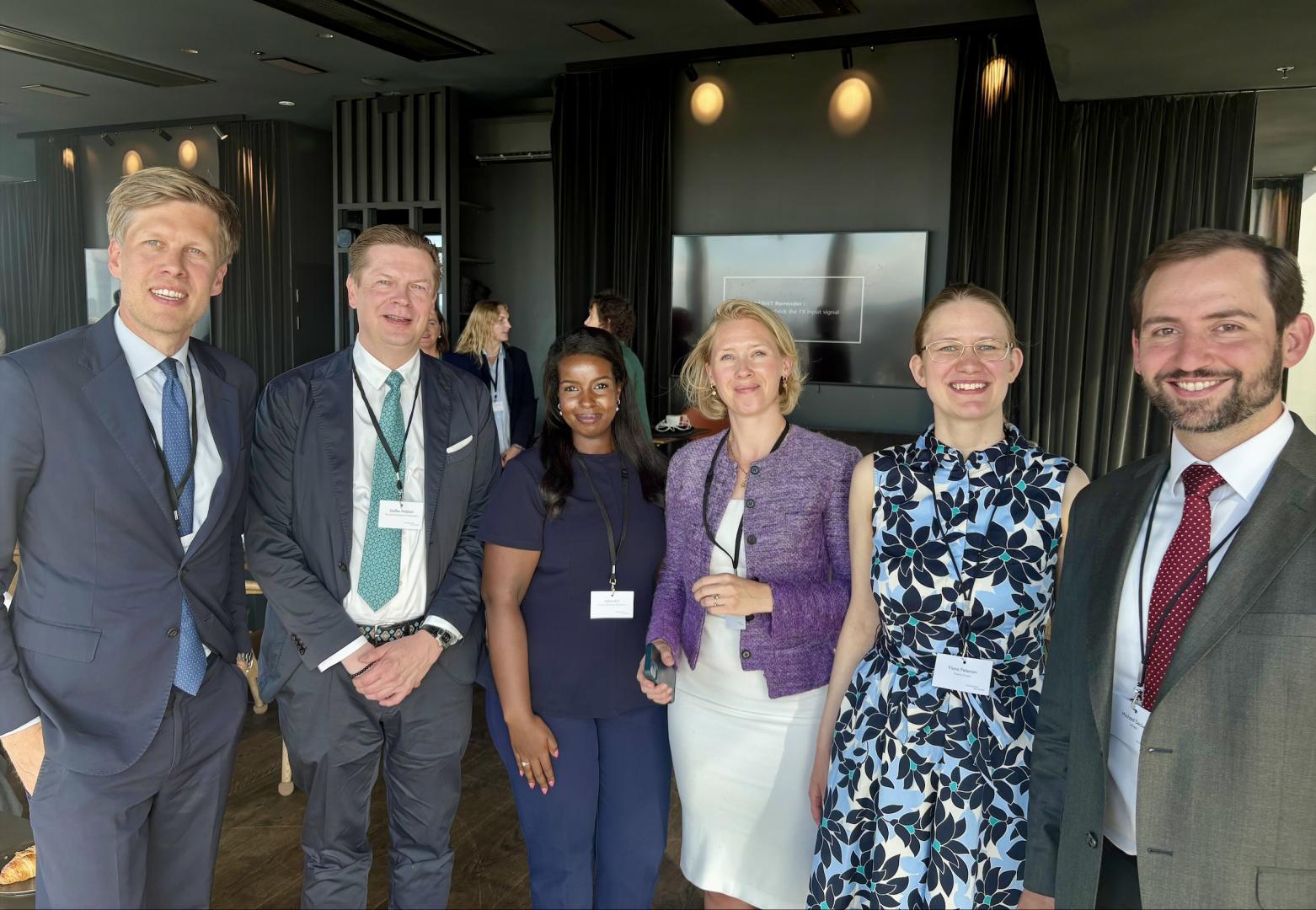Young ICCA Workshop on Oral Advocacy
Young ICCA is pleased to invite you to a Breakfast Skills Training Workshop on Oral Advocacy.
Registration and breakfast will begin at 9:00, and the event will start promptly at 9:30, running until 11:30.
The event will feature a mock submission on the admissibility of evidence in an arbitration proceeding, followed by structured feedback from a tribunal and an open discussion on effective oral advocacy techniques. Designed to provide practical insight and guidance, the workshop is aimed at young practitioners and students looking to sharpen their advocacy skills.
Our oralists are two rising stars in international arbitration:
- Fiona Petersen, Associate, Twenty Essex (London)
-
Michael Decker, Associate, Schjødt (Copenhagen)
The mock tribunal will consist of:
- Melanie van Leeuwen, Partner, Vanguard International Dispute Resolution (Paris)
- Claus Juel Hansen, Partner, Kromann Reumert (Copenhagen)
-
Katherine Bell, Partner, Schellenberg Wittmer (Zurich)
The session will be moderated by:
-
Sahra Arif, Legal Counsel, Danish Institute of Arbitration (Copenhagen)
We extend our sincere thanks to Katrine Tvede (Ashurst / Young ICCA Co-Chair), Morten Adler-Nissen (Kromann Reumert), Danna Zhang (Slaughter and May), and Jadranka Jakovcic (Young ICCA Co-Director of Events) of the Organizing Committee for their invaluable support in making this event possible.
This workshop is organized by Young ICCA and generously sponsored by Kromann Reumert, with the kind support of the Danish Institute of Arbitration and Young Arbitrators Copenhagen (YAC). The event will take place ahead of the main programme of Copenhagen Arbitration Day.

Young ICCA Skills Workshop: The Art of Oral Advocacy
Copenhagen, Denmark | 4 September 2025
Post-Event Report by Jonas Schou Meding (Kromann Reumert)
On 4 September 2025, Young ICCA hosted a skills workshop on Oral Advocacy at The Silo in Copenhagen during the 2025 Copenhagen Arbitration Days. The workshop convened arbitration practitioners for a mock hearing to further develop their oral advocacy skills. The case concerned the admissibility of evidence in an arbitration proceeding, much inspired by the procedural issues of the 32nd Vis Moot.
The event commenced with welcoming remarks by Young ICCA Co-Chair Katrine Tvede (Senior Associate, Ashurst, UK), who introduced Young ICCA's founding history, mission, and activities, including the Mentoring Program. Next, Morten Adler-Nissen (Partner, Kromann Reumert, Denmark), presented the members of the tribunal and the oralists and outlined the mock problem. The oralists, Fiona Petersen (Barrister, Twenty Essex, UK) and Michael Decker (Partner, Schjødt, Norway) then presented submissions before a distinguished mock arbitral tribunal composed of Melanie van Leeuwen (Partner, Vanguard International Dispute Resolution, France), Katherine Bell (Partner, Schellenberg Wittmer, Switzerland), and Claus Juel Hansen (Partner, Kromann Reumert, Denmark). The oralists argued on the admissibility of two disputed evidentiary items, specifically an internal email sent by Claimant’s in-house counsel (Exhibit R3), and an offer from Respondent labelled "without prejudice" (Exhibit C7). The submissions focused on legal privilege, procedural fairness, and confidentiality.
Submissions and Questions from the Tribunal
The parties agreed to address the admissibility of Exhibit R3 first, followed by Exhibit C7.
Ms. Petersen (Claimant's counsel) argued for excluding Exhibit R3 on two grounds:
-
The email contained legal advice from in-house counsel and should be protected under Equatorianian law regarding legal privilege. Applying Mediterraneo’s law, where Claimant’s counsel was admitted, would be procedurally unfair. Equatorianian law would ensure equal footing between the parties.
-
There were serious doubts about how Respondent obtained the email. Under IBA Rules (Rule 9.3), illegally obtained evidence may be excluded. As the submitting party, Respondent should bear the burden of proving lawful acquisition.
The tribunal actively engaged with Ms. Petersen’s arguments, questioning the choice of applicable law and challenging whether equal footing should outweigh the expectations of the parties to the email, both situated and acting in Mediterraneo.
Mr. Decker (Respondent's counsel) opposed the exclusion of Exhibit R3, arguing:
-
General principles of due process, sanctioned in the relevant legal regimes, including the New York Convention, require tribunals to admit all relevant evidence unless strong reasons justify exclusion. The stakes were thus high, and exceptions should be applied cautiously.
-
Legal privilege lacks a uniform standard. The “closest connection” test would favor Mediterraneo, where the counsel was admitted and the advice was prepared. This approach has the upside of offering predictability for legal practitioners.
-
Illegality claims regarding Respondent’s acquisition of Exhibit R3 were unsubstantiated. While tribunals may exclude unlawfully obtained evidence, this power must be exercised with restraint. In this instance, the claims were mere allegations, and, drawing inspiration from recent case law from Switzerland, the threshold in this regard is high.
The tribunal challenged Mr. Decker on the way in which Respondent had obtained the evidentiary item in question, also probing into the proper allocation of the burden of proof to this matter.
For the exclusion of exhibit C7, Mr. Decker put forth two main arguments:
-
The document marked “without prejudice” constituted a settlement offer and was protected under Article 15.2 of the 2024 FAI Mediation Rules. The parties’ drafting history supported extending confidentiality beyond mediation.
-
Claimant sought to prove mediation futility, but the document reflected an initial offer, not evidence of futility, and should therefore be deemed irrelevant.
Mr. Juel Hansen challenged the classification of Exhibit C7, prompting Mr. Decker to argue that its practical implications support its nature as a settlement offer.
Ms. Petersen countered that the tribunal must assess the document’s relevance to the futility question and not the futility itself. She emphasized that the final paragraph reflected a demand for price reduction, not an invitation to engage in settlement discussions.
Ms. Petersen further argued that legal privilege only applies to documents containing admissions against interest. Citing Best Buy and Ernest Ferdinand, she maintained that Exhibit C7 lacked such admissions, and its “without prejudice” label did not warrant exclusion.
Tribunal Feedback and Observations
Following the submissions, the tribunal shared reflections from the mock hearing and their broader experience in the roles of arbitrator and counsel.
- Ms. van Leeuwen asked how her co-arbitrators would rule on admissibility if acting alone. Both Ms. Bell and Mr. Juel Hansen would likely exclude Exhibit R3, with Ms. Bell citing procedural integrity, and Mr. Juel Hansen emphasizing the burden of proof. Exhibit C7 was more nuanced, since it required the arbitrators to focus on the document’s context, intent, and content. Both Mr. Juel Hansen and Ms. van Leeuwen leaned toward admissibility.
-
The tribunal commended the oralists’ advocacy styles, noting that clear structure and responsiveness to both opposing arguments and tribunal questions are essential for effective advocacy.
Discussion and Reflections
Following the mock hearing, Sahra Arif (Legal Counsel, Danish Institute of Arbitration) moderated a thoughtful discussion on effective oral advocacy, including how counsel can best prepare for hearings and adapt their approach to the tribunal’s composition. The conversation explored how differences in legal training, jurisdictional background, and professional experience among arbitrators may influence how arguments are received and assessed.
-
The oralists stressed the importance of mastering the case and legal principles. Ms. van Leeuwen agreed, noting that well-prepared counsel earns the tribunal’s trust and confidence.
-
A structured and conservative style was favored amongst the oralists, especially when addressing culturally diverse tribunals. However, regardless of one’s natural pleading style, understanding the audience and adapting accordingly is essential in both written and oral advocacy.
-
The arbitrators emphasized authenticity in advocacy style, balanced with awareness of how different tribunals respond. Observing the tribunal’s reactions throughout the proceedings was seen as key to a successful submission.
Concluding Remarks
The workshop underscored oral advocacy’s importance in international arbitration and offered valuable insights to both emerging and experienced practitioners. Key takeaways:
-
Master the case and the file;
-
Observe the tribunal’s reactions and questions;
-
Be mindful of legal and cultural backgrounds; and
-
Present arguments clearly and with structure.
The event concluded with remarks from Sahra Arif. The event offered an optimal lead-in to the official program of Copenhagen Arbitration Day 2025.
Thank you to Kromann Reumert and the Danish Institute of Arbitration for sponsoring and arranging the event.
Want to receive event updates from Young ICCA?
Sign up for Young ICCA Membership and you'll receive event notifications direct to your inbox.






